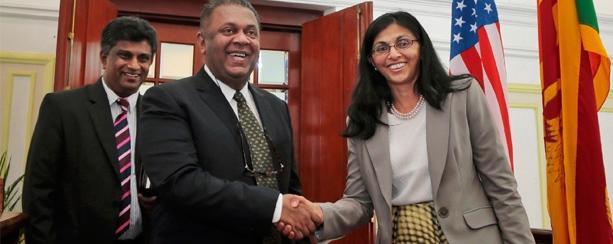[Sri Lankan FM Samaraweera and US Assistant Secretary of State for South and Central Asian Affairs Nisha Biswal shake hands ]
WASHINGTON (AP) — The surprise defeat of Sri Lanka’s authoritarian leader and the new government’s early steps to end repression have stirred U.S. hopes that the South Asian island nation can revive ties with Washington and distance itself to some degree from Beijing.
Under former President Mahinda Rajapaksa, relations with China intensified, with heavy Chinese investment in the strategically located island along busy sea lanes between the Persian Gulf and East Asia. Once-robust ties with the U.S. deteriorated sharply, even as President Barack Obama pushed to engage nations across Asia and consolidate America as a Pacific power.
Washington took an important step toward rebuilding the relationship with the Monday arrival of the top diplomat for South Asia, the first visit by a senior State Department official since former Rajapaksa ally Maithripala Sirisena won Jan. 8 elections.
“Sri Lanka can count on the United States to be partner and a friend in the way forward,” Assistant Secretary of State Nisha Biswal told reporters, speaking alongside Foreign Minister Mangala Samaraweera. She said the new government has already taken many positive steps but “there is a lot of hard work ahead and some difficult challenges.”
She also noted that no country in the world buys more Sri Lankan products than the United States.
Samaraweera is expected to visit Washington later this month.
Obama wants a deeper partnership with Sri Lanka and U.S. officials say the early signs are promising.
Within a week or so of taking office, Sirisena rolled back restrictions on the press and civil society. He also vows to reduce powers of the presidency that been inflated by Rajapaksa when his popularity ballooned during the ending of Sri Lanka’s bloody civil war.
U.S.-Sri Lanka relations were strained over Rajapaksa’s reluctance to investigate thousands of reported civilian deaths in the final chapter of the quarter-century conflict in 2009, when government forces crushed Tamil rebels who had been fighting for an ethnic homeland.
Sirisena has been cautious about promising action on accountability, but he did offer an early fig leaf to minority Tamils, who supported him at the polls, when he quickly replaced an unpopular ex-military governor appointed by Rajapaksa in the former battle zone in the north of the country.
The new government also says it is reviewing one of a series of major Chinese-financed infrastructure projects: a $1.5 billion land reclamation for a “port city” in the capital, Colombo. That’s a blow to Beijing’s progress in winning an ally in the Indian Ocean.
But officials in Colombo are also being careful not to alienate Beijing. Rajitha Senaratne, a Cabinet spokesman, said Sri Lanka does not “need to tilt towards any side.”
“China has been a historical friend of ours, India is also the same,” he told The Associated Press. “Our exports go to the E.U. and U.S.” The new government assured India it will not align itself to any world power.
Two recent port calls by Chinese submarines at a Chinese-built terminal in Colombo, one before a visit in September by China’s leader Xi Jinping, fueled speculation that Beijing’s wants a “string of pearls” or port access along sea lanes linking the energy-rich Persian Gulf and economic centers in eastern China. The submarine visits spooked India, which lies just 30 miles from Sri Lanka and shares U.S. uncertainty about Beijing’s intentions as China’s military power grows.
Washington has its own strategic reasons to be interested in Sri Lanka.
A 2007 agreement, sealed before relations with Rajapaksa soured, permits the U.S. and Sri Lanka to exchange nonlethal supplies and refueling during humanitarian operations and joint military exercises.
The U.S. has a significant economic stake in the nation of 20 million people. U.S. financial institutions are major investors in Sri Lankan bonds, and the U.S. is the second-largest market for Sri Lankan exports
By MATTHEW PENNINGTON, Associated Press
